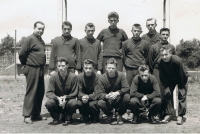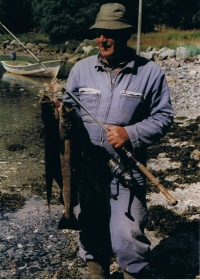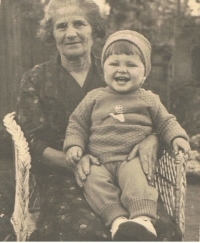I saw black dots in the sky. They were bombs and they were falling on us
Stáhnout obrázek
Jaroslav Kučírek was born on 16 February 1936 in Brno. His father Jaroslav, born in 1901, was a geometrist, his mother Anna, born in 1904, was a teacher. His childhood was marked by the war. Until the end of the 1930s, Czechs, Germans and Jews lived together in Brno without any problems. However, this changed with the beginning of the war, when most Germans turned to radical nationalist ideas. The witness valued all the more those who maintained their friendship with the Czechs, such as the Spesny family, whose sons he was friends with. After the occupation of Brno, the Germans introduced arms production in local factories and used the civilian airport and railway station for war purposes. Therefore, at the end of the war, the city was a strategic target for Allied and Soviet bombing. The daily practice was to escape to a shelter after the alarm was raised. Jaroslav experienced the first carpet raid on Brno on 25 August 1944, which was his nightmare for many months after the liberation. When the Soviet army approached Brno, preceded by a bad reputation, the Kucireks retired to the safety of a cottage area near Tišnov. There, however, a resistance unit was stationed, thanks to which they actually avoided a direct war clash. Another shocking experience for the then nine-year-old boy was the journey home. They walked through places where fighting had taken place and they saw traces of the cruelty of war at every turn. In 1954, the witness graduated from high school in Brno and then fulfilled his dream of becoming a doctor. He graduated from the Military Medical Academy in Hradec Králové in 1960. At the end of 1959 he married Pavlina, née Vychytilova (1934 to 2018), and in 1960, 1964 and 1970 they had three children. He started his compulsory practice in the military hospital in Josefov and also as a unit doctor in Vysoké Mýto. In 1962, Jaroslav Kučírek was discharged due to an injury to a reservist and worked at the Vysoké Mýto Hospital. From 1964 to 1996 he worked at the district hospital in Ústí nad Orlicí, where he built the first inpatient anaesthesiology and resuscitation department in the East Bohemia region. In 1968, he became the head of the department. He was never a party member. Thanks to the department‘s primacy and top-notch care at the time, he also had the favour of officials from the district, who sometimes got him the necessary equipment for patients. In November 1989, he became involved in the activities of the Civic Forum and became director of the hospital. In 1996, he went to the health insurance company where he was the chief reviewing physician for three years. His credo is the way forward - to always be inquisitive and optimistic. In 2023, he was living in Nekor. He died on March 6, 2024.


